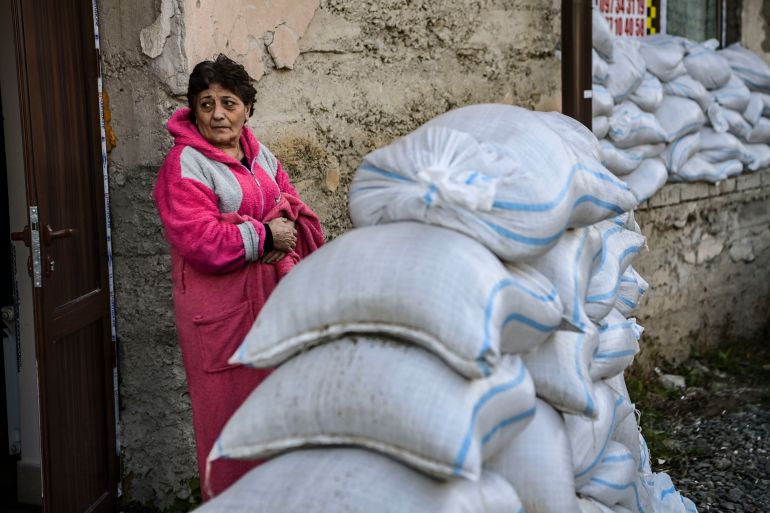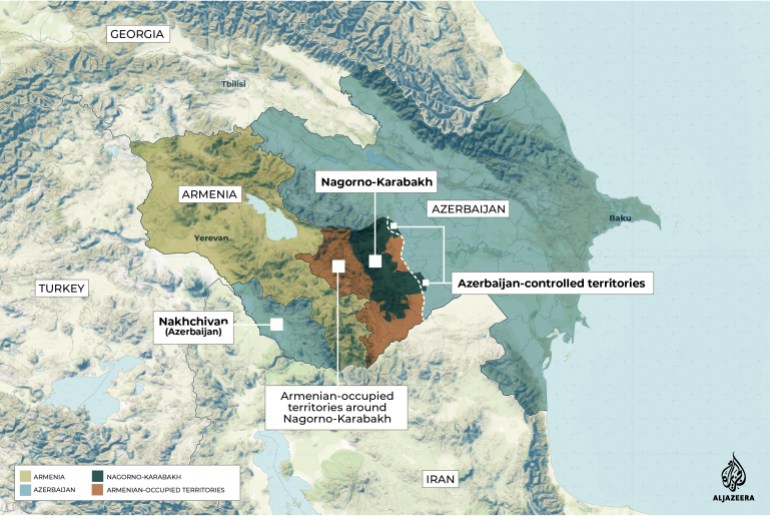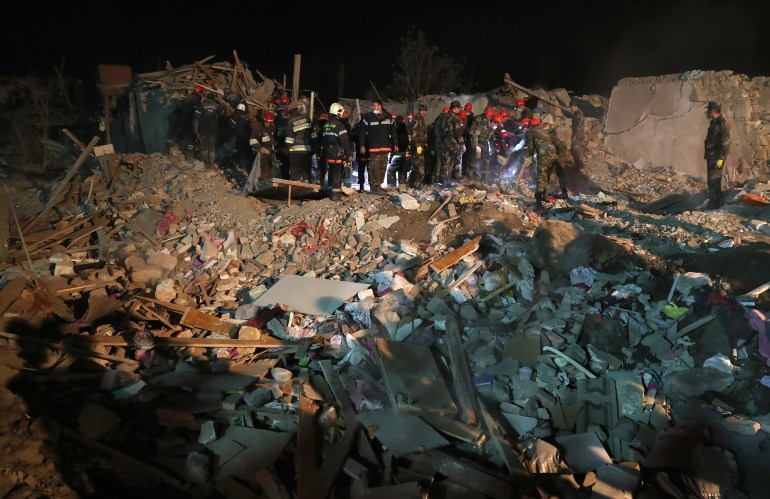What role is Russia playing in the Nagorno-Karabakh conflict?
Moscow sells weapons to both Armenia and Azerbaijan but has also led attempts for the battling sides to put down their arms.

Two centuries ago, Russian czars proudly proclaimed that they “liberated” Armenians from the rule of Ottoman Turkey and Iran.
Right after World War II, Soviet leader Joseph Stalin planned to invade and annex eastern Turkey to “expand” Soviet Armenia and get access to the Mediterranean.
Post-Communist Russia seems to be following the same pattern of “protecting” Armenians from their neighbours – Turkic-speaking ex-Soviet Azerbaijan and its closest ally, Turkey.
And when the festering, decades-old conflict over Nagorno-Karabakh, a mountainous breakaway region of Azerbaijan dominated by ethnic Armenians since the early 1990s, reopened in late September, it was Russia that stepped in as a peacemaker.
Armenian leaders still think that their best hopes lie with Moscow.
“In recent days, Russia could play its role of Armenia’s strategic ally … at the highest level,” Armenian Prime Minister Nikol Pashinyan said in televised remarks on October 14.
“I am sure it will keep playing this role unambiguously and undoubtedly, in the best traditions of friendship of the Armenian and Russian people.”
Armenian observers say that their nation – along with ethnic Armenians of Nagorno-Karabakh – maintains the pro-Moscow geostrategic balance in the Southern Caucasus region that straddles Eastern Europe and Middle East.
To them, the biggest flareup of the Nagorno-Karabakh conflict that has killed hundreds of soldiers and dozens of civilians is a mere resumption of Ankara’s “imperialistic” policies – and anti-Armenian sentiments that led to the mass killings of Armenians in Ottoman Turkey a century ago.
Armenia and many Western nations call the killing of up to 1.5 million Armenians a “genocide”, while Turkey refutes such accusations.

“It is the resistance of Armenians that helps maintain the geopolitical balance” in the region, Boris Navasardian, an analyst based in the Armenian capital, Yerevan, told Al Jazeera.
“Otherwise, the world would face yet another precedent, a fait accompli – extermination of some Armenians and expulsion of other Armenians from Nagorno-Karabakh and the establishment of Turkey’s dominance over most of the Southern Caucasus,” he said.
But the days of Russian czars obsessed with the “return” of Constantinople to Orthodox Christians and upending Ottoman Turkey’s dominance over the Middle East and the Balkans are long gone.
These days, the confrontation between Turkey and Russia has no such overtones.
Russia has clashed with Turkey regarding Syria and Libya, but another direct confrontation seems out of sight.
And Moscow’s pro-Armenian tilt has not result in severed ties with Baku.
Azerbaijani President Ilkham Aliyev studied diplomacy at a prestigious Russian university, and his father and predecessor Heydar Aliyev spent decades working in Moscow as a top KGB officer.
But many Azerbaijanis see Moscow’s preference as the main obstacle in settling the oldest conflict in the former Soviet Union.
“It was Russia that helped occupy Nagorno-Karabakh and districts around it, and has all these years stood in Baku’s way to settle the conflict peacefully,” Baku-based analyst Emil Mustafayev told Al Jazeera.
While Ankara pledged to back Azerbaijan, Turkey’s linguistic and cultural sibling, “until the end of the occupation,” Russia seems to be limited to a secondary role, some observers say.
Armenia and Russia are part of a security treaty of six ex-Soviet nations, which does not include Azerbaijan, that must help each other militarily in case of armed conflicts. Moscow also has a military base in Armenia, but the Kremlin has not dispatched a single soldier to support the Armenians.
After the hostilities began, Russia only conducted navy drills in the Caspian, north of Baku – and hastily said that they “don’t pose any threat and don’t impose restrictions on the economic activities of the Caspian littoral states”.
Russia’s peacemaking efforts have also failed.
Two Moscow-brokered ceasefires inked on October 10 and October 18 were broken within hours, but Russian diplomats rule out a military solution to the conflict.
“We stand by our viewpoint – a peaceful settlement is not only possible, it remains the only way,” Russian Foreign Minister Sergey Lavrov said on October 14.
Some see this political inertia as a sign of weakness.
“Moscow is almost not reckoned with, it appears like a declining power and doesn’t show any principles, and it is the principles that play a big role in international relations,” Pavel Luzin, a Russia-based defence analyst with the Jamestown Foundation, a Washington think-tank, told Al Jazeera.
The lack of principles is especially apparent when it comes to arms sales.
Moscow has for years been shipping weaponry to both Baku and Yerevan.
In a buying spree fuelled by petrodollars, oil-rich Azerbaijan spent some $24bn on arms between 2008 and 2018, according to the Stockholm International Peace Research Institute (SIPRI), a think-tank that monitors military spendings worldwide. Baku bought tanks, APCs, artillery systems, multiple rocket launchers and drones made in Russia, Belarus, Turkey and Israel.
Yerevan was vexed by Russia’s eagerness to supply arms.
“This is a very painful issue for us. Our nation is very concerned about the fact that our strategic partner is selling weapons to Azerbaijan,” Armenia’s President Serzh Sargsyan said in 2014.
His resource-poor and cash-strapped nation mostly got cheaper and older Russian weaponry – free of charge or on credit, spending a mere $4bn in 2008-2018, but spending up to a fifth of its annual state budget, the SIPRI said.
Another explanation of Russia’s indecisiveness is the peaceful 2018 uprising that toppled pro-Russian and allegedly corrupt President Sargsyan and installed former publicist Pashinyan at the helm. He tried to diversify Armenia’s political alliances and sought closer ties with the West.

“Armenia is, in essence, paying for its neoliberal discourse personified by Pashinyan,” Aleksey Kushch, a political analyst based in the Ukrainian capital, Kyiv, told Al Jazeera.
He says that the Kremlin throws its political weight behind separatist regions in the former Soviet Union – in Ukraine’s Donbass, Moldova’s Transnistria and Georgia’s South Ossetia and Abkhazia – as long as their instigators do not veer off a pro-Russian course.
“Russia’s ‘coercion to friendship’ will take place anywhere [in the former Soviet Union] where street revolutions won,” he said using the term “coercion to peace” coined in the Kremlin during the 2008 Russian-Georgian war.
The current conflict may have long-term consequences for Moscow’s clout in the South Caucasus.
“Judging by the statements of [President] Aliyev that a new era will begin in the region after the war, Baku has finally made serious conclusions about Russia’s role, and its ties with Moscow won’t be the same,” analyst Mustafayev said.